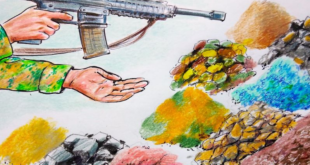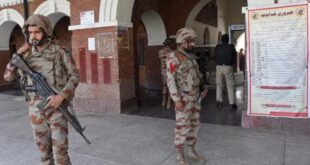U.S. Secretary of State Antony Blinken has warned Afghanistan that it may have to face a Taliban onslaught on its own if President Ashraf Ghani fails to urgently consider proposals on accelerating the peace process.
“I must also make clear to you, Mr. President, that as our policy process continues in Washington, the United States has not ruled out any option. We are considering the full withdrawal of our forces by May 1st, as we consider other options,” the letter said.
Fearing that might lead to a worsening of the security situation and the Taliban making swift territorial gains, Blinken added, “I am making this clear to you so that you understand the urgency of my tone regarding the collective work outlined in this letter.”
A source in Ghani’s office confirmed that the Afghan president had received a letter from Blinken.
The letter, a copy of which VOA has obtained, outlines the intense diplomatic efforts under way over Afghanistan and the expectations from Ghani.
Blinken said the U.S. would ask the United Nations to “convene foreign ministers and envoys from Russia, China, Pakistan, Iran, India, and the United States to discuss a unified approach to supporting peace in Afghanistan.” These were the countries, according to the secretary of state, that had to work together for a chance at successfully resolving Afghanistan’s conflict.
He also said the U.S. would ask Turkey to host a high-level meeting of Afghan stakeholders and the Taliban in the coming weeks to “finalize a peace agreement,” and urged Ghani to send his representatives.
The U.S., Blinken said, had prepared a revised proposal for a “90-day Reduction-in-Violence, which is intended to prevent a spring offensive by the Taliban.”
A spring offensive is when the Taliban start their attacks with renewed energy after a lull or a reduction forced by the harsh winter months in Afghanistan’s mostly rugged terrain.
The reduction in violence is a top demand of the Afghan government and the international community, which says the Taliban kept the levels unacceptably high despite a February 2020 deal with the U.S.
In return, Blinken asked Ghani to show “the urgent leadership that President Biden and I ask of you in the coming weeks” by working with political rivals and others to create a united front that Afghans regard as “inclusive and credible.
“[D]isunity on the part of Afghan leaders proved disastrous in the early 1990s,” Blinken told Ghani.
The letter asked Ghani to “develop constructive positions” on proposals the U.S. envoy on Afghanistan peace, Zalmay Khalilzad, brought with him to the region last week in an effort to jumpstart the flailing peace process
The proposals included the formation of a “’transitional Peace Government of Afghanistan” that would eventually transfer power to a permanent government “following the adoption of a new constitution and national elections.” Taliban spokesman Mohammad Naeem told VOA that Khalilzad shared with them the proposal and said Taliban leaders will study it before a formal response is issued.
“I suspect this letter could worsen relations between Ghani and the Biden administration, given that the letter makes clear that the U.S. is prepared to take steps to help put together a new Afghan government, something that Ghani has rejected because it likely wouldn’t include him,” said Michael Kugelman, the deputy director for the Asia program at the Washington-based Wilson Center, a policy forum group.
The idea of a transitional setup has been floating around in various forms since before the Afghan presidential elections of 2019, but Ghani has always bristled at the suggestion.
Soon after Khalilzad left Kabul for Doha, Qatar, to meet the Taliban, Ghani seemed to publicly reject the proposal.
“[F]ree, fair, and inclusive elections under the auspices of the international community” should be the only way to form a new government, Ghani said Saturday while inaugurating the third year of the 17th legislative term of the Afghan National Assembly.
Without naming Khalilzad, Ghani also dismissed what he said was a dream written on sheets of paper.
“These papers were written in the past, are written now, and will be written in the future,” he said. “Our constitution is our national document. We do not need other documents.”
The Taliban reject the Afghan constitution. Changes to it are expected to be on the agenda during negotiations between the insurgents and government.
Ghani’s political rival, Abdullah Abdullah, who chairs the High Council for National Reconciliation (HCNR), said all proposals should be discussed.
The proposals are in a document titled “Afghanistan Peace Agreement,” a copy of which VOA has obtained. It suggests a three-part approach including agreement on the guiding principles for a future constitution, terms for governing the country during the transition period, and terms for a comprehensive cease-fire between the warring factions.
The document suggests setting up a new High Council for Islamic Jurisprudence to advise and provide religious guidance to local and national governments and the judiciary.
It also tries to ensure protection of women’s rights and freedom of speech along with other civil liberties, suggests a nonaligned foreign policy for Afghanistan, and recommends setting up a 21-member commission, including 10 representatives of the Taliban, to work on the new constitution.
The proposed agreement demands both sides “immediately announce and implement an end to all military and offensive operations and hostile activities against the other.”
A cease-fire has been a longstanding demand of the Afghan government, but the Taliban have always resisted.
People like former U.S. Special Representative for Afghanistan and Pakistan, (SRAP) Richard Olson, say that is because “the only leverage they have is the use of violence,” referring to the Taliban. “They are dreadfully unpopular politically,” he said.
The cease-fire terms also demand that the Taliban “remove their military structures and offices from neighboring countries, and they agree to end military relations with foreign countries.”
Top U.S. and Afghan officials have repeatedly alleged that top Taliban leadership lives in Pakistan. U.S. officials have occasionally also accused Iran and Russia of helping the Taliban. The three countries deny the allegations.
 Eurasia Press & News
Eurasia Press & News



